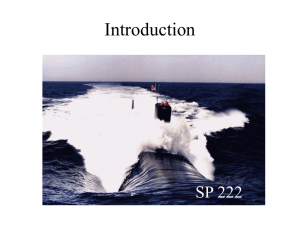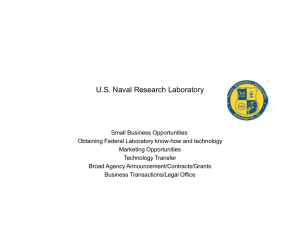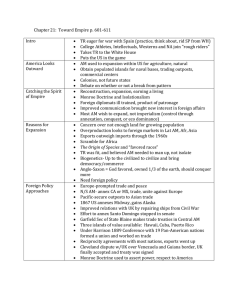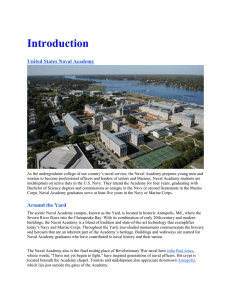SECNAVINST 1531.2C DNS/CNO MPP 17 June 2009 SECNAV INSTRUCTION 1531.2C
advertisement
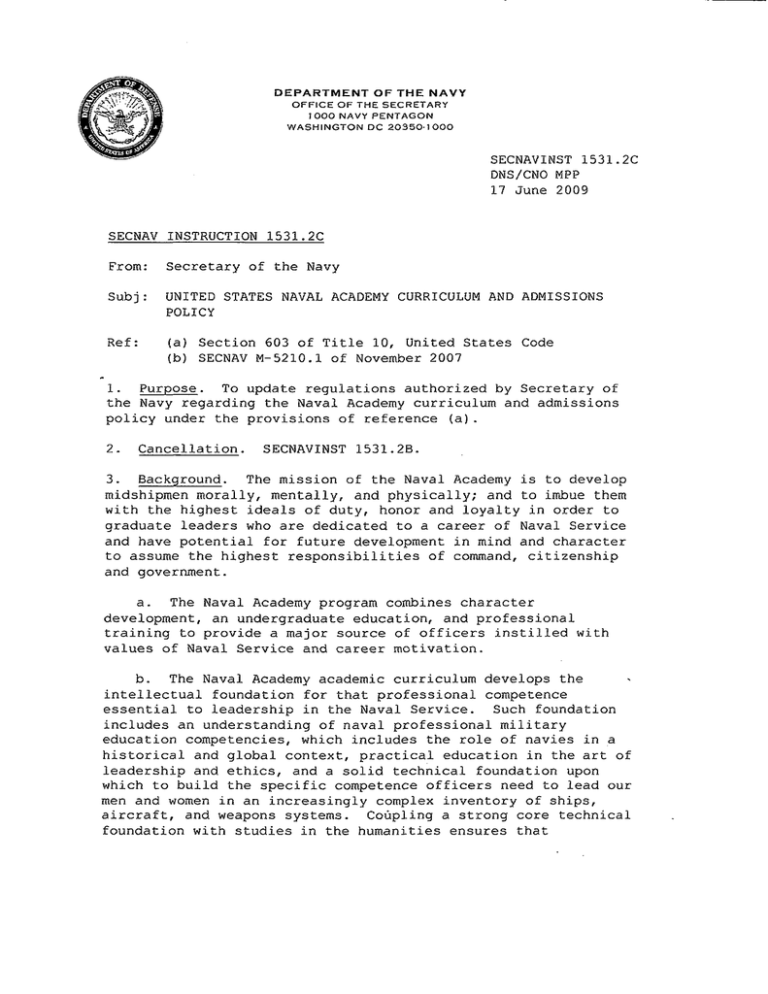
DEPARTMENT OF THE N A V Y OFFICE OF THE SECRETARY 1OOO NAVY PENTAGON WASHINGTON DC 2O35O-1OOO SECNAVINST 1531.2C DNS/CNO MPP 17 June 2009 SECNAV INSTRUCTION 1531.2C From: Secretary of the Navy Subj: UNITED STATES NAVAL ACADEMY CURRICULUM AND ADMISSIONS POLICY Ref: (a) Section 603 of Title 10, United States Code (b) SECNAV M-5210.1 of November 2007 1. Purpose. To update regulations authorized by Secretary of the Navy regarding the Naval Academy curriculum and admissions policy under the provisions of reference (a). 2. Cancellation. SECNAVINST 1531.2B. 3. Background. The mission of the Naval Academy is to develop midshipmen morally, mentally, and physically; and to imbue them with the highest ideals of duty, honor and loyalty in order to graduate leaders who are dedicated to a career of Naval Service and have potential for future development in mind and character to assume the highest responsibilities of command, citizenship and government. a. The Naval Academy program combines character development, an undergraduate education, and professional training to provide a major source of officers instilled with values of Naval Service and career motivation. b. The Naval Academy academic curriculum develops the intellectual foundation for that professional competence essential to leadership in the Naval Service. Such foundation includes an understanding of naval professional military education competencies, which includes the role of navies in a historical and global context, practical education in the art of leadership and ethics, and a solid technical foundation upon which to build the specific competence officers need to lead our men and women in an increasingly complex inventory of ships, aircraft, and weapons systems. Coupling a strong core technical foundation with studies in the humanities ensures that SECNAVINST 1531.2C 17 June 2009 midshipmen, regardless of major, are adequately prepared for service in any warfare specialty. Since the Naval Service requires officers with technical backgrounds to provide a high level of technical leadership and proficiency in our wardrooms, midshipmen will be encouraged to select engineering and science majors. 4. Admissions. Naval Academy admissions procedures must support the primary objectives of selecting candidates who: a. Are mentally and physically able to undertake rigorous academic, professional education, as well as physical training programs; b. Show interest in serving their country as professional officers in the Naval Service; c. Show capabilities and interest in fields of study that reflect the needs of the Navy and Marine Corps; d. Show potential for leadership in the Naval Service; e. Show the capacity and desire to complete the 4-year course and remain in the Service beyond the period of obligated service after commissioning; and f. Are of good moral character. 5. Curriculum. The foundation of the academic curriculum is a core of disciplines required of all midshipmen which provides the basic tools for scientific inquiry, logical and conceptual reasoning, problem-solving, and clear expression, both oral and written. a. The core curriculum is designed to produce junior officers capable of meeting the demands of modern technology in the Naval Service. It also fosters a greater comprehension of the Naval Service's role in the modern international environment. These demands require a core curriculum that provides a well-integrated program of progressively challenging study in engineering disciplines, mathematics, and sciences, as well as in humanities and social sciences. SECNAVINST 1531.2C 17 June 2009 b. Each midshipman is required to complete the requirements of an academic major. This study-in-depth is designed to stimulate intellectual curiosity and foster intellectual maturity. c. The core curriculum effectively prepares midshipmen for postgraduate technical training, regardless of major, and permits the selection of majors without regard to quotas for engineering, mathematics/science, humanities, or social science. d. The curriculum contains strong ethical components in the core and major courses. 6. Guidance. The superintendent is responsible for ensuring Naval Academy admissions criteria and curriculum meet the stated objectives. 7. Records Management. Records created as a result of this instruction, regardless of media and format, shall be managed in accordance with reference (b). )BERT O. Under Secretary of the Navy Distribution: Electronic only, via Department of the Navy Issuances Web site http://doni.daps.dla.mil/

